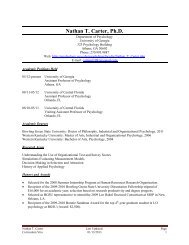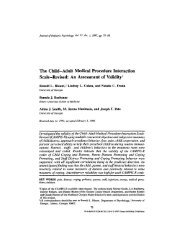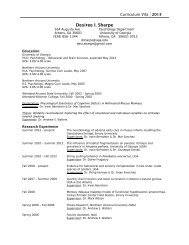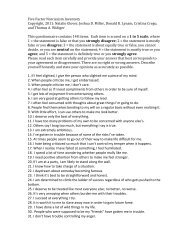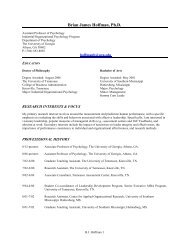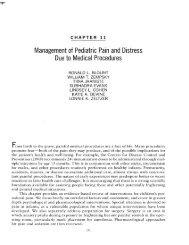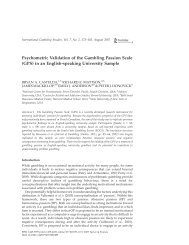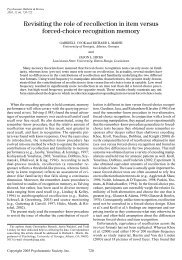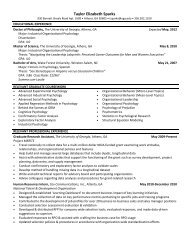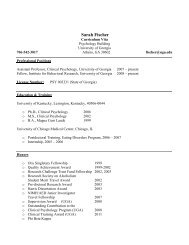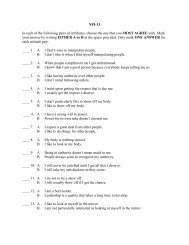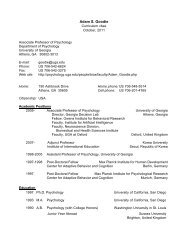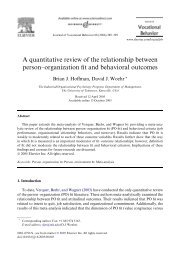Guidelines for recommendation letters for graduate school
Guidelines for recommendation letters for graduate school
Guidelines for recommendation letters for graduate school
You also want an ePaper? Increase the reach of your titles
YUMPU automatically turns print PDFs into web optimized ePapers that Google loves.
<strong>Guidelines</strong> <strong>for</strong> <strong>recommendation</strong> <strong>letters</strong> <strong>for</strong> <strong>graduate</strong> <strong>school</strong><br />
This page is designed to give general guidelines to students who are seeking a letter<br />
of <strong>recommendation</strong> <strong>for</strong> <strong>graduate</strong> <strong>school</strong> from a faculty member in the Psychology<br />
Department. You should always speak to the faculty member directly, ideally at least<br />
two months be<strong>for</strong>e the letter is due, to find out what specific in<strong>for</strong>mation they want<br />
from you, and in what <strong>for</strong>mat. However, the in<strong>for</strong>mation below can serve as a<br />
general "checklist" of things that you should be willing to provide <strong>for</strong> your letter<br />
writers.<br />
Faculty members are generally happy to write <strong>letters</strong> of <strong>recommendation</strong> <strong>for</strong><br />
students who have done well in our classes or who have been reliable contributors to<br />
our labs. Writing <strong>recommendation</strong> <strong>letters</strong> is a time-consuming process, but it is an<br />
important service <strong>for</strong> students, and it is one that our faculty take very seriously.<br />
The hardest part of writing a letter is writing the first draft; subsequent <strong>letters</strong> are<br />
generally just a matter of replacing the name of one <strong>school</strong> with another. Be<strong>for</strong>e a<br />
faculty member can write a good letter <strong>for</strong> you, you need to provide them with as<br />
much in<strong>for</strong>mation as possible, so that their letter can be in<strong>for</strong>med and specific. You<br />
should provide a copy of the in<strong>for</strong>mation requested below at least a month be<strong>for</strong>e<br />
your letter is "due." You shouldn't ask a faculty member to put the work into writing<br />
a letter be<strong>for</strong>e you have done the work of putting together the in<strong>for</strong>mation and<br />
writing your personal statement.<br />
General guidelines<br />
1. You generally should only ask a professor to write you a letter if you have made<br />
an A or a B in their class, have worked in their lab, and/or have talked with them on<br />
several occasions about your post-college plans. In some cases a professor might be<br />
able to write a good letter <strong>for</strong> a student who has gotten less than a B in their class,<br />
but generally this level of per<strong>for</strong>mance wouldn't allow them to make a strong<br />
endorsement of your academic potential.<br />
2. Many professors will recommend is that you waive your right to inspect your files<br />
and your <strong>letters</strong>, and some won't write a letter <strong>for</strong> you unless you do so. The reason<br />
<strong>for</strong> this is that if you don't waive this right, <strong>graduate</strong> <strong>school</strong>s may not take the letter<br />
seriously, because it may look like you have something to "hide." If you can't trust<br />
what a professor has to say about you, then they may not be the right person to be<br />
writing the letter <strong>for</strong> you.<br />
3. Put all of this in<strong>for</strong>mation together at least a month be<strong>for</strong>e the first deadline. Feel<br />
free to talk to the professor if you have questions or are unsure about any part of it,<br />
but the earlier you get started on this, the better. Contact the UGA Career Services<br />
office or the Psychology Under<strong>graduate</strong> Advising Office (room 219) <strong>for</strong> in<strong>for</strong>mation if<br />
you are unsure of how to create a vita or resume, how to write a personal statement,<br />
etc.<br />
4. Writing the personal statement is the most difficult part of the process of applying<br />
<strong>for</strong> <strong>graduate</strong> <strong>school</strong>. There are many websites and books available with advice and<br />
guidelines on how to get started -- look through the resources in the Psychology<br />
Under<strong>graduate</strong> Advising Office (room 219) <strong>for</strong> help. One bit of advice: be sure to talk<br />
about your specific experiences that are relevant <strong>for</strong> that program, why you are
applying to that specific program, and what your goals are to do with your degree.<br />
You need to do your homework on the programs to which you are applying. It needs<br />
to sound like a professional statement of background and goals, and not like a "diary<br />
entry." Most <strong>graduate</strong> <strong>school</strong> admissions committees are looking <strong>for</strong> specific<br />
in<strong>for</strong>mation and clear goals, not creativity, in the essay.<br />
5. If you are using a professor as a reference <strong>for</strong> a job or are applying to programs<br />
that do not require a personal statement, you still need to write out a description of<br />
your career goals, what type of job you hope to get, etc.<br />
In<strong>for</strong>mation needed (at least a month be<strong>for</strong>e the first deadline):<br />
_____ Your vita (or resume). Be sure to include in<strong>for</strong>mation on research<br />
experiences, extracurricular activities, or anything else that you think would be<br />
relevant <strong>for</strong> the professor to mention in your letter.<br />
_____ Your personal statement (the essay in which you outline your goals and<br />
reasons <strong>for</strong> applying to <strong>graduate</strong> <strong>school</strong>)<br />
_____ a copy of your transcripts (unofficial, a photocopy of your transcript or<br />
something printed off OASIS, is fine), with the courses you took with the professor<br />
highlighted. Be sure to write the semester and year of the class if that's not apparent<br />
from the transcript.<br />
_____ your GRE (or other required professional test) scores, if applicable.<br />
_____ a LIST: all the <strong>school</strong>s to which the professor will send a letter, including<br />
application deadlines. Organize the list chronologically, by the date on which the<br />
letter is due. Please be sure to list the precise degree you are seeking, and give the<br />
exact name of the department (e.g., seeking a Ph.D. in Developmental Psychology<br />
from the Department of Psychology; seeking a M.Ed. in Counseling from the<br />
Department of Educational Psychology).<br />
_____ addressed and stamped envelopes <strong>for</strong> all <strong>letters</strong> (put the professor's return<br />
address on the front). Be sure to type these or write them neatly.<br />
_____ <strong>recommendation</strong> <strong>for</strong>ms <strong>for</strong> the <strong>school</strong>s that provide them. Fill in the<br />
professor's name and all of their contact in<strong>for</strong>mation on the <strong>for</strong>ms (neatly).<br />
Complete all in<strong>for</strong>mation on the <strong>for</strong>m, including the professor's name, rank, address,<br />
etc. This in<strong>for</strong>mation can be found on their personal web page elsewhere in this<br />
website. For example:<br />
Dr. Katherine Kipp<br />
Associate Professor<br />
Department of Psychology<br />
University of Georgia<br />
Athens, GA 30602-3013<br />
Phone: 706-542-2174 (this is the department phone number)<br />
Email: kipp@uga.edu<br />
Contact the specific professor if you have any questions about this.



